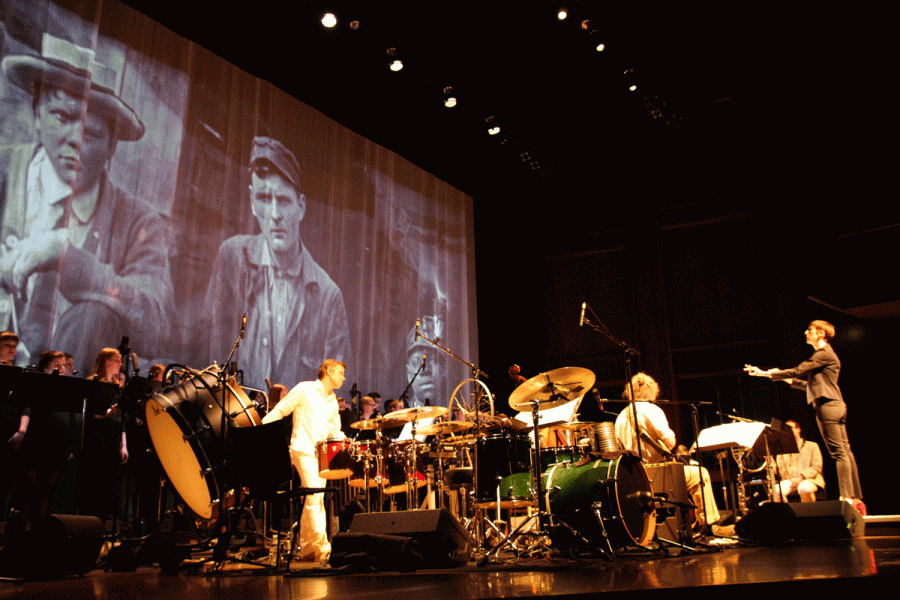Weis Center’s Coal Series draws to a close
April 6, 2017
The Place Studies program of the Bucknell Center for Sustainability & the Environment (BCSE) has teamed up with the Weis Center for Performing Arts to collaborate on a year-long series focusing on the topic of anthracite coal, titled “Coal Collections: Local, National, and International Stories.”
Throughout the 2016-2017 academic year, Coal Collections has featured and will continue to feature documentaries, musical performances, theatre/puppetry and art, panel discussions, lectures, and guest speakers.
This series brings a remarkable historical celebration to campus, as well as an intellectual conversation about Pennsylvania’s very own history and industry. The series allows the broader University community to experience a component of Pennsylvania’s anthracite coal regions at the local, national, and international level, highlighting key historical aspects and culturally rich stories from coal regions worldwide.
The spring semester has brought 12 events to the year-long series. On Jan. 26, the semester’s Coal Collections series began with a Noon Lecture Series, titled “Athletics in the Anthracite Coal Region,” a panel discussion about the distinct relationship between athletes and the coal region. The event featured Bucknell Hall of Fame alumni and local sports commentators, as well as former MLB pitcher Steve Kline and former NFL running back Henry Hynoski, Sr.
The second event was a film screening of “Stories from the Mines,” a documentary that depicts the anthracite coal region’s impact on the relationship between the U.S. government and labor and wealth within the nation. The film’s executive producer Tom Curra and Interim Dean of Management Michael Johnson-Cramer discussed the film with attendees.
Another Noon Lecture Series was held on Feb. 16, where Associate Professor of Spanish Fernando Blanco discussed coal mining in Chile, along with members of the puppet company, Silencio Blanco, who discussed the power of storytelling through puppetry. The next day, the company performed a puppetry ensemble titled “Chiflón, El Silencio del Carbón,” a story depicting the collapse of a dangerous mine in Chile.
University of Wyoming Professor Ellen Currano presented a lecture titled “Tales of plant evolution and ecology recorded by the fossils between the coal beds” on Feb. 23. On March 23, Samek Art Museum Public Programs and Outreach Manager Greg Stuart spoke in a Noon Lecture Series that explored the arts and visual culture of the anthracite coal region.
The next week brought three more Noon Lecture Series: “The Immigrant Experience of the Coal Region” on March 28; “Pennsylvania’s Anthracite Coal Region: Present to Future” on March 30; and “The Creation of the Anthracite Fields” on March 31.
Julia Wolfe’s Anthracite Fields Oratorio
Julia Wolfe, a 2016 MacArthur Fellow and winner of the 2015 Pulitzer Prize for Music, visited the University on April 1 and presented her incredible oratorio, or large scale musical piece comprised of vocals and supported by an orchestra customarily focused upon a central theme. Wolfe’s oratorio focused on the turn of the 20th century Pennsylvania coal miners. In her Pulitzer prize-winning choral performance, Wolfe honored the workers of the Pennsylvania anthracite fields region by combining history, personal interviews conducted with miners and their families, speeches, rhymes, and local mining lore.
Wolfe addressed the horrendous and inhumane mining conditions in her emotional and poignant collaboration. The large scale musical work provided a narrative on the lives and families of coal miners, highlighting specific stories, including that of a 76-year-old woman named Barbara Powell who grew up as the daughter and granddaughter of coal miners. Wolfe’s oratorio provided a depiction of Powell’s father’s survival of a myriad of atrocities, including being buried alive.
Another movement titled “Flowers” described the way families decorated their homes. Although mining was the large part of the Powell family’s culture, Powell expressed that she would never wish for coal mining to return to American culture.
Ultimately, the Coal Collections series provided an enriched cultural background of the anthracite coal region, as well as its many historical connections to the University and the state of Pennsylvania.
For more information about the Coal Collection series, visit www.Bucknell.edu/CoalCollections.






















